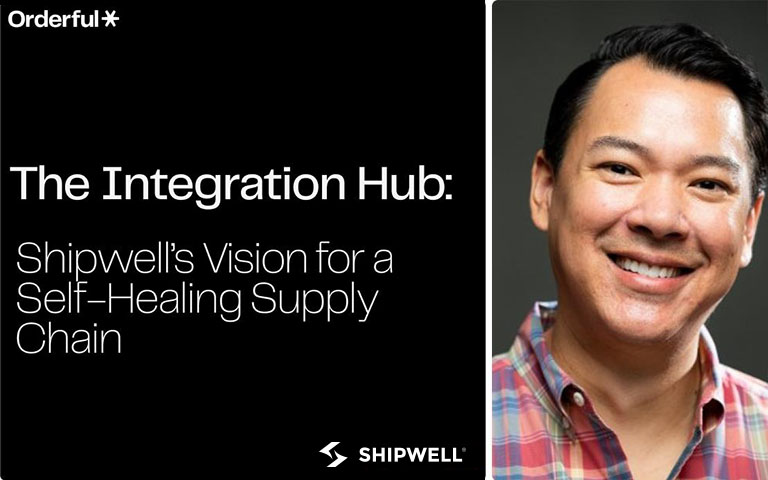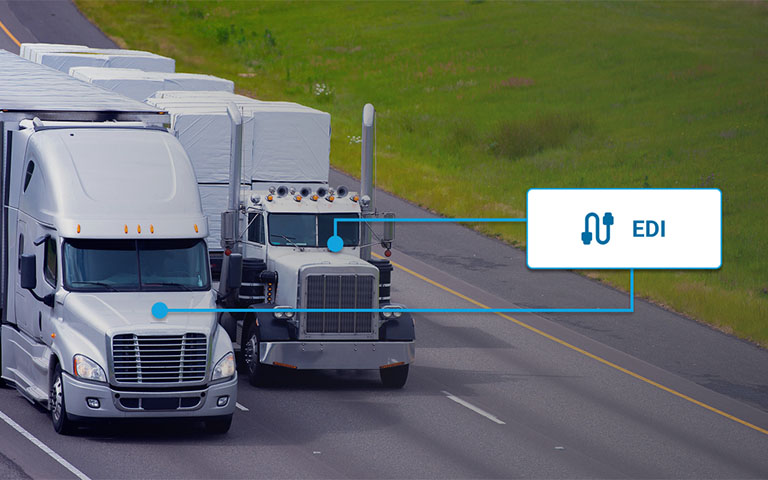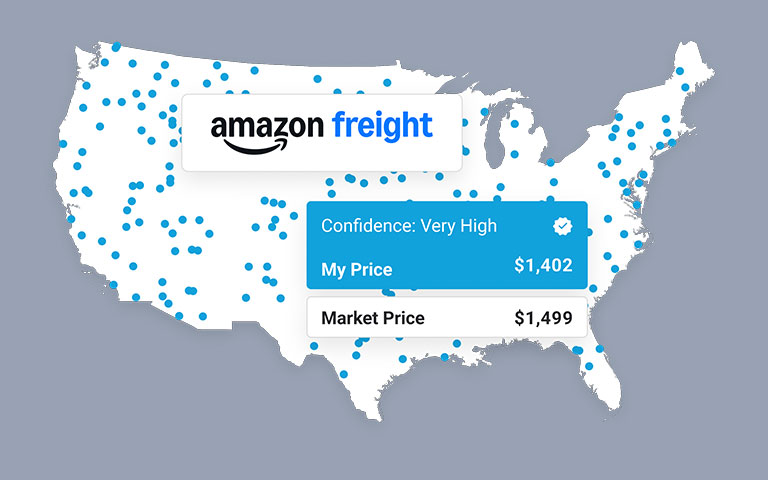Jason Traff on The Integration Hub Podcast: AI, EDI, and the Future of Supply Chain Tech

What if your supply chain could think for itself? On Orderful’s “The Integration Hub” podcast, I explore how logistics is evolving from a patchwork of spreadsheets and phone calls into an intelligent nervous system—one that senses, adapts, and heals itself in real time.
Shipwell’s mission was born from frustration with fragmented information and manual processes. Our vision: a unified platform where shippers, carriers, and 3PLs connect seamlessly, merging the physical flow of goods with the digital flow of data.
The conversation dives into the future of logistics: moving from mere visibility to prescriptive, self-healing systems. Modernizing core infrastructure like EDI is essential, because you can’t build a digital future on analog plumbing. As innovators, its our responsibility to build for people. Technology should amplify human expertise, not complicate it.
Find out more by watching the episode on YouTube, listening on Spotify, or Apple Podcasts to hear the full conversation, or read on via the transcript below.
{{divider}}
Orderful’s “The Integration Hub” with Jason Traff, Shipwell
Grace Sharkey:
And everyone, I want to introduce you to one of my favorite co-founders in this industry as well, Jason Traff, co-founder and president of Shipwell. Jason, thank you so much for joining us. I'd love if you could give us a little bit of a backstory on Shipwell and why it was important for you to found this company, especially for the problems that you want to solve in supply chain.
Jason Traff:
Hey, Grace, it's great to see you again. Starting Shipwell. So I guess the inspiration came from a place of frustration, really. For me, I had an oil painting business. We shipped paintings all over the world. And to be honest, shipping was the worst problem we had. And then I reconnected with my co-founder, Greg, who's our CEO, who had just left McKinsey, and he was doing Fortune 100 supply chain consulting. And we just…
We compare our notes and what we could see was all these massive, sophisticated supply chains operating with incredible friction. And it felt like an industry where everyone tries so hard, but it's still run by fax machines and spreadsheets. And so I remember the first aha moment we had was we were trying to track a critical shipment and everyone has these stories, but it took days on days and it took dozens of phone calls. And eventually it was just, it was a wild experience. And so the core problem we started Shipwell to solve was the fragmentation of information.
We wanted to give shippers, carriers, and 3PLs one single pane of glass, like an intelligent nervous system that connects the physical movement of goods with the digital flow of data. And that was the original mission behind Shipwell.
Grace Sharkey:
Well, I wanna dive into that journey, especially looking at the early days of Shipwell, because you guys have a really interesting, I guess, journey in that discovery as well. In those early days, was there a moment where you started to realize, okay, the way we're building this thing out is really gonna change the way that logistics providers, brokers, et cetera, attack this industry?
Jason Traff:
Yeah, we're not just the same scrappy team running on caffeine and dreams anymore. Even though I'd still like to think we're very much a startup still at heart, even though we power some of the most recognizable and fastest growing brands in the world now. And so I guess for Shipwell, just as a TMS, as a transportation management system, usually for each major feature, there's been at least one aha moment that was like an acute customer pain point, just because of the nature of how supply chains are.
But I think probably the first one was back in 2019 when we released our Compass dashboard. This is a predictive ETA model. We've always had real-time visibility through carrier tracking, but with Compass, we combined it with real-time weather, real-time traffic, so we could create a dashboard to help customers manage their supply chains more proactively. And one of our early customers, a large food and beverage company, told us that because they could see these alerts ahead of time, they were better able to manage by exception. And this helped them cut their number of check calls in half and save tens of thousands in detention. But specifically for them, it helped them avoid hundreds of thousands of dollars by avoiding these expedited emergency purchases that stem when a truck just doesn't show up when it's supposed to. And then all of a sudden, they're out in New Jersey, 10 o'clock at night trying to buy 20,000 pounds of lobster, which, as you can imagine, gets expensive quickly.
Grace Sharkey:
I just actually got back from a New York City trip and I remember saying myself, how do trucks get in and out of this area? It's maddening and I remember trying to cover loads in and out of there just completely. To talk about the visibility aspect, right, like you have no visibility of what capacity is in there. So having that tool must have been incredible, especially…
You talk about the timeline, right? For that company to really look at that feature right before COVID and capacity issues really started to hit them. Talk about pro-activeness, right? That's a perfect example of that working out for them as well. And as you start to see your growth over the last couple of years, there's been this, of course, I think over the last five years, that big focus on our platforms. And I think that pro-activeness, right?
From your perspective, where do you think Shipwell is better at attacking the problems in supply chain compared to other innovators out there?
Jason Traff:
I think that's a really interesting question. You know, there's this thought of supply chain software has existed for decades. You know, I think both of our companies sort of embody that. And I think you're right that the space is buzzing, right? There's a level of focus on it that there's never really been before. For Shipwell, you know, while we hold a number of accolades, we are generally one of the newer companies in sort of our TMS space and…
I think that some of those things we were able to do differently was one, just when we started, we were able to use a cloud native technology, full REST APIs without even getting into the machine learning and AI stuff we did. But I think we also, we had the benefit of being able to design solutions, not just for one party. So many TMSs out there were built for shippers or brokers or carriers, and Shipwell was built from the ground up to be the network itself. We connect and not just integrate everyone.
Our technology doesn't just manage data, we will use AI to orchestrate decisions. We'll use machine learning to help with algorithmics. We're not just digitizing a rate quote, we're automating the entire tender to settlement lifecycle so that smarter decisions can be made. And so I think one of the real differences, and part of this is just when we were able to start the company, but we've been able to be holistic and network centric and build a very, I think, native approach that sets our technology apart.
Grace Sharkey:
That's incredible. And you touched on this too, the AI of it all, right? We can't avoid that conversation these days in the tech space. How has AI been a part of Shipwell's journey in particular? And maybe even more so on the automation side of things. Where do you see practical applications being impacted today in logistics from it?
Jason Traff:
Yeah, we rarely go a day without either us or me talking about AI. And so you're right. It's certainly very topical. For Shipwell, this is an area we've been close to for a while. So we've had generative AI in the platform for about two years now. We would brag that over a quarter of Shipwell's customers are using AI in their production environments now to real and practical effects.
And so I think the areas we've seen most customers find success is taking a very narrow pain point that's usually low impact. It's something that takes a lot of energy and a lot of time from their team, but is something that's very straightforward to automate. So this could be automating order imports from emails, responding to tracking, even proactively doing tracking and tracing, shipping quotes based on emails and documents, classifying carrier documents. This is a big one.
And then even scheduling appointments. I think these are all areas where we've seen AI really provide a better ROI over sort of the industry standard tools they're used to using.
Grace Sharkey:
You know, it's how we actually at Orderful look at our AI journey as well. You might not see it in every aspect of the technology, but one of the biggest areas we use it is in those kind of mundane, nuanced areas of EDI, and that's the communication to build, right, the guidelines to make sure that this data moves smoothly between systems. And we all know that there's a huge human element to that, right, the customer service between different providers.
We're not, we've never shied away from that being a problem in the EDI space. So we've always focused on how can we use automation? How can we use AI to make that process shorter leading to a faster onboarding experience as well? So it's, I like that your team is creative and focuses on those. I don't want to say mundane, but those tasks that do take off, take a lot of time off of your team's plate for areas that they can be more innovative, right? And I think everyone has seen that in Shipwell's technology, the outcome of that AI journey as well. For you, looking ahead, two to three years down the line, what technology bets are you making that you think will fundamentally shift, whether it's Shipwell or just supply chain operations in general?
Jason Traff:
Yeah, I mean, I think there are there are few really exciting things that are happening. I think the trend that we are investing deeply in and very excited about is this this pivot from visibility to prescriptive action. So when we started Shipwell, which to be honest, wasn't even that long ago, visibility was really the big buzzword knowing where your stuff is. I think that's table stakes now. One of the reasons that we built visibility native into Shipwell was so that we could use that data to automatically fix the problems before they impact our customers and their businesses. And so we've always thought of it as moving from like a diagnostic tool to a self-healing supply chain. And so in our view, this is the norm. Customers should be able to manage their supply chains by exception and automate everything around it. And that's sort what we're starting to see now is that visibility is becoming mainstream. The other one that we're really excited about is this convergence of like execution and financial systems.
Jason Traff:
So historically, TMS systems have focused on the truck and finance systems have focused on the payment. Now that we're seeing automation in everything, especially in documents, the OLs, proof of deliveries, invoices, we're seeing a lot of automation from initial quote all the way to final carrier payment and audit in one flow. And we've seen a lot of customer impact in that as well.
Grace Sharkey:
Cashflow is so big in this industry and for every participant as well. I have a little bit more of the brokerage operations background in me. That right there, I always tell people, brokerage is pretty much in a way a floating bank. And it's important to make sure that cashflow stays healthy so that you can continue to stay competitive with your carriers. And then the carrier side, goodness, that's probably the most cash flow focus part of the industry in terms of the carriers that we need to to stay afloat, have the ability to fill up their tanks and, and know when that payment is going to arrive on time with with such low margins that they have those the financial pieces I think is more important than ever. And it's interesting because I see people sometimes start their entrepreneurial journey in this space and don't consider that and quickly realize, you could have millions of dollars of revenue, but if you're not managing and I think like what you touched on the visibility of the payment cycle, right? If that's not there, if that journey isn't exposing kind of your weak points, then you're really gonna have some issues growing and scaling down the line. So I'm happy that you're seeing that change or anticipating that change, because I think that's where most companies tend to fail in this industry is losing track of what money is coming in and out. And speaking of in and out, Jason, let's get into the EDI journey of it all, right? I'd love if you could give us a little bit of background on Shipwell looking into its EDI services and its journey with Orderful as well.
Jason Traff:
Yeah, EDI, what a fun topic, right? So for Shipwell, we've always seen ourselves as a multi-sided platform that was built and architected to future and scale. And so we've always said that we want to innovate at the API layer and simplify at the UI layer. But with EDI, it's just kind of this essential, yet often painful bedrock of logistics communication.
And so the challenges that we had were twofold. One, integrating new partners, especially legacy systems, felt like a journey back in time. We could spend weeks writing complex, brittle integrations that would break with updates. And it was a drag. It was a drag on engineering resources and not an area that we felt we were truly innovating in. And externally for our customers, it was a hurdle to digitization. So they couldn't move at the speed of the markets because they…
Tied to these slow, expensive manual EDI setups. And so what we wanted was a future-proof solution that allowed us to onboard any partner in hours, not weeks.
Grace Sharkey:
Yeah, that's our focus has been that and I'm happy that you guys have have looked at EDI as a Advantage point right being able what's incredible is I think you've built all this great technology But at the what you just touched on understanding right if that Data isn't flowing in there properly if there's you know any issues with errors, etc I mean charge backs things of that nature that it kind of falls apart and why when people ask me why I came into this EDI space, I think that's what makes it fun for me. Yeah, it's not the sexiest thing out there, right? It's not the most fun topic to talk about because I think it has so many headaches. But as it sounds like your team has found out too, it's that piping that makes this all work. And it's also not going away. I think people have always brought up the EDI API argument and...
EDI from especially the large players in this space and large retailers, et cetera, that use it. I don't think we're gonna convince them to walk away from it today or tomorrow as well. So I'm happy that you've had that positive experience. there's supply chain leaders today listening to this, Jason, why do you think modernizing that piece of your tech stack is important for the broader journey of technology?
Jason Traff:
Yeah, I think EDI is here for a while. So I think that's timely. I've always liked this analogy that you can't build a castle on sand. And similarly, when you look at something as foundational as EDI, you can't build a true digital supply chain built on this analog plumbing. And so for us, modernizing EDI wasn't just about checking a box. It was about eliminating a large barrier to speed and data quality and automation.
Grace Sharkey:
Yeah.
Jason Traff:
And so if you have to wait weeks to months to onboard a new partner, if your data is riddled with errors from sort of manual entry, broken mappings, know, that entire digital transformation is handicapped. so, you know, modern EDI, like what Oracle provides, you know, kind of gets closer to this idea of like a plug and play ecosystem. So it can be a critical infrastructure piece, you know, that allows you to scale your network and leverage all those exciting and automation technologies that we were talking about earlier.
Grace Sharkey:
Yeah, it's fun being a part of a technology that I think itself is going through its own revolution, right? And being the leader in that space, just like you are in the space that Shipwell is in as well.
You know, to wrap this up, Jason, if you had to give one piece of advice to founders or leaders out there trying to build tech for this industry.
What would that be from what you've learned at Shipwell and what you see from the future of freight tech as well?
Jason Traff:
Yeah, my advice is actually really similar to something that you were saying earlier when you were talking about the pain points of brokers and carriers. And my advice is to solve for the human. You know, this industry is complex and technical and massive, but at the end of the day, it's run by millions of very passionate, very hardworking people, the drivers, the dispatchers, the warehouse managers, the logistics analysts. It's a very long list and you can't just build technology that adds another screen or another step.
You have to build technology that respects their time, that makes their jobs easier, that leverages their expertise. And ultimately, we feel that the technology that wins isn't just the most complex, it's the one that is so intuitive and helpful that people on the front lines can't imagine doing their jobs without it. So we would often say simplification is the ultimate sophistication.
Grace Sharkey:
I love that. Good metaphors today, Jason. I'll say I love the castle on the sand one too. I'm gonna steal that. We'll clip that one. We'll definitely get that in there. Jason, for everyone watching today, if they're looking to learn more about Shipwell or interested in even seeing a demo, what's the best way for them to reach out to your company and learn?
Jason Traff:
Yeah, please feel free to visit us at Shipwell.com.
Grace Sharkey:
Love it. Jason, thank you so much for being a wonderful partner with us here at Orderful. And thank you so much for joining me for a fun conversation on tech in the space.
Jason Traff:
Thanks, guys.
Grace Sharkey:
Perfect.
{{divider}}


.svg)








